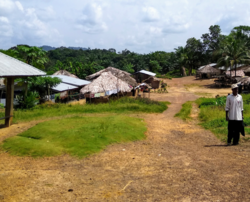Front Page Africa | 23 January 2020
Charity calls on UK to prosecute British companies that violate human rights in Liberia
Monrovia – The United Kingdom should create a law that will compel British companies to respect human rights and environmental sustainability in countries they operate or be made to account for not doing so, a recent report by the charity Traidcraft Exchange is urging the government of that country.
Released earlier this month, Traidcraft Exchange’s “Our Land: Land Grabbing in Liberia and the Case for a New UK Law” report focuses on Equatorial Palm Oil, which is listed on the Alternative Investment Market (AIM) of the London Stock Exchange. The report found EPO violated local townspeople’s right to their land and are pushing them further into poverty and have not been made to account for it.
“If the UK’s commitments to defend human rights are to mean anything, companies must be held accountable for their role in commissioning and benefitting from human rights violations,” the report said. “If UK companies are acting with impunity overseas, they should be tried in UK courts for their human rights violations,” it added. “This already happens for other types of ‘cross-border’ crime such as bribery or tax evasion. A law clarifying the responsibility of a company to respect human rights in its international operations would make it much easier to bring cases to the UK courts.”
The report said EPO enjoyed the economic and legal stability and access to investment that comes with being registered in the United Kingdom and should should protect human rights and the environment.
Liberia wouldn’t be able to prosecute cases of human rights abuses in concession areas because the country lacked resources, and that its prosecutors were inexperience to hold large international investors properly accountable in the courts, the report further said. Even Liberia could prosecute human rights violations and environment-related crimes, companies would go to neighboring countries with looser laws and regulations, it added.
EPO denied any wrongdoing. In a statement published in the report, the company said, “We do not develop on land that communities do not wish us to do so.”
The UK is a pioneer in laws that relate to business and human rights but has been lagging behind in recent years while other countries have created laws targeting multinationals. France, for instance, in 2017 created the Devior de Viligence law that requires large companies to properly assess the human right risks and their supply chains, and to take measures to address them. Similar laws are under discussion in Switzerland, Germany and the Netherlands.
RELATED POSTS
Liberia: Bikers Block Main Streets of Buchana Over Gasoline…
Jan 28, 2020
Liberia: Arrest Made in Killing of German Expat; Suspect…
Jan 27, 2020
Liberia: Varney Taylor Foundation Pays Bomi Students’…
Jan 24, 2020
EPO has its headquarters in London’s Piccadilly and registered. It was founded in 2005, and a Malaysian palm oil giant has been the majority shareholder since 2013. It signed a concession agreement with Liberia to develop palm plantation on 169,000 hectares of land in Grand Bassa, River Cess and Sinoe. These agreements were made without properly consulting and gaining the consent of the communities who had owned and used that land for generations, the report found.
EPO arrived in Palm Bay in 2012 with big promises. They would bulldoze the trees and crops around the villages and use it to expand the oil palm plantation, according to the report, and in return the communities would be handsomely compensated with large cash payments for the crops that were destroyed. Five villages handed their land to EPO. However, none signed a contract or a memorandum of understanding with the company and promised compensation has not been paid, the report noted.
“They started counting the crops. When they concluded the counting and it was time for the payment they changed the price from $97.92 to $6 [for each rubber tree],” the report quoted one local, G. Hilary Gbah. “When we asked what was the reason, they told us that the government had changed the price. But if the government had changed the price, why were we not notified?”
The report quoted a number of other townspeople claiming that the company threatened them, took away their farmlands and creating confusion in communities.
Traidcraft urged the Liberian government to put into place measures to curtail land grab and human rights abuses in concession communities. The charity called for the proper implementation of the Land Rights Act of 2018, which recognizes customary land rights. It urged the government to provide support for fair negotiation between concessionaires and communities whose land they wish to acquire, and support those communities in understanding the new land law.
Moreover, the report called for monitoring and compliance of the palm oil companies and with international laws and standards. It urged for the reform of the current oil palm plantation model to a more environmentally sustainable smallholder model that protects communities’ land ownership.
British citizens should call on Prime Minister Boris Johnson to introduce a law requiring UK companies to respect human rights and the environment, and they should call on members of parliament to support the development of such a law, the report said. It further recommended that citizens to write to companies using palm oil, asking them to share their evidence that the palm oil in their products isn’t grown on illegally grabbed land and the list of the websites where the palm oil is produced.
There were recommendations for investors and financiers in the report with a call for any investment in companies engaged in land transactions is subject to enhanced due diligence, including a full human rights and environmental impact assessment.













